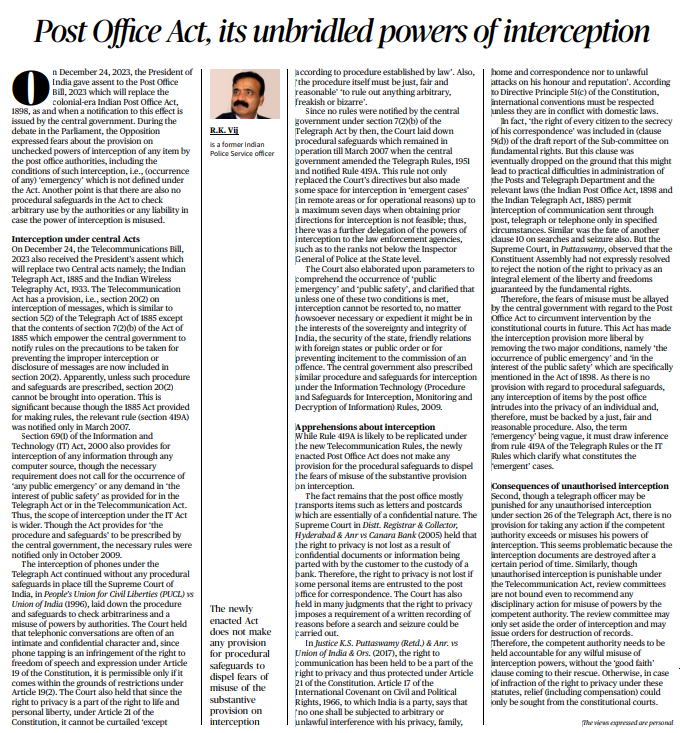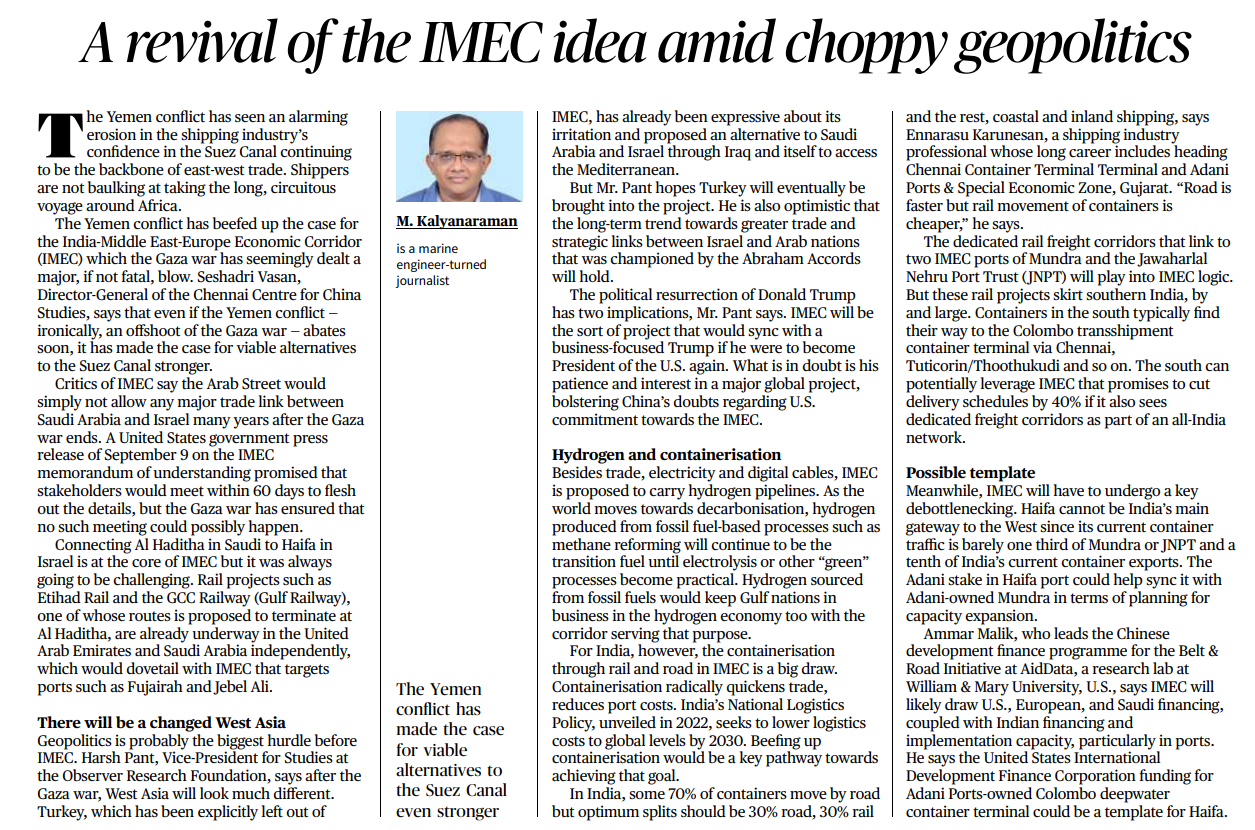Post Office Bill, 2023: Unchecked Powers and Lack of Safeguards
Background:
– President’s assent to the Post Office Bill, 2023 on December 24, 2023.
– Replaces the colonial era Indian Post Office Act, 1898, upon notification by the central government.
Concerns Raised in Parliament:
– Opposition voices concerns about unchecked powers of interception by post office authorities.
– Lack of defined conditions for interception, particularly the term ’emergency.’
– Absence of procedural safeguards, raising fears of arbitrary use and potential misuse.
Telecommunications Bill, 2023: Replacing Colonial Acts
Replacement of Central Acts:
– President’s assent to the Telecommunications Bill, 2023, on the same day.
– Replaces Indian Telegraph Act, 1885, and Indian Wireless Telegraphy Act, 1933.
Comparison with Telegraph Act:
– Section 20(2) of the Telecommunications Act mirrors section 5(2) of the Telegraph Act.
– Inclusion of safeguards from section 7(2)(b) of the 1885 Act into section 20(2).
– Requirement for prescribed procedures before section 20(2) becomes operational.
Interception in Information and Technology Acts
Scope under IT Act:
– Section 69(1) of the Information and Technology (IT) Act, 2000, allows interception of information.
– Broader scope than Telegraph and Telecommunications Acts.
– Rules for ‘procedure and safeguards’ notified in October 2009.
Historical Context:
– Supreme Court intervention in 1996 to establish safeguards for telephonic interceptions.
– Rule 419A introduced in 2007 under the Telegraph Rules, replacing court directives.
– Parameters for ‘public emergency’ and ‘public safety’ clarified by the Court.
Concerns and Legal Framework
Apprehensions about Post Office Act:
– Post Office Act lacks provisions for procedural safeguards, causing apprehensions.
– Supreme Court’s stance on the right to privacy and written recording of reasons.
Legal Framework and International Conventions:
– Right to communication protected under Article 21 of the Constitution.
– International Covenant on Civil and Political Rights emphasizes privacy rights.
– Need for alignment with international conventions under Directive Principle 51(c).
Potential Consequences and Accountability
Unauthorized Interception:
– Lack of provisions for actions against competent authorities for exceeding or misusing interception powers.
– Destruction of interception documents poses challenges in holding authorities accountable.
– Review committees’ discretionary powers in recommending disciplinary actions.
Conclusion and Recommendations:
– Central government urged to address fears of misuse in the Post Office Act.
– Emphasis on just, fair, and reasonable procedures for interceptions.
– Call for accountability measures to prevent unauthorized misuse of interception powers.
Yemen Conflict Impact on Suez Canal Confidence:
Yemen Conflict Impact on Suez Canal Confidence:
- The ongoing Yemen conflict has instilled a palpable sense of apprehension within the shipping industry, causing a noticeable erosion in confidence regarding the Suez Canal’s reliability as the longstanding backbone of East-West trade.
- Shippers, faced with heightened uncertainties, are not hesitating to opt for the longer and more circuitous route around Africa, raising significant concerns about the Suez Canal’s continued dominance.
Strengthening the Case for IMEC:
- The Yemen conflict, paradoxically stemming from the Gaza war, has served to fortify the argument for the India Middle East Europe Economic Corridor (IMEC) as a viable alternative to traditional maritime routes.
- Seshadri Vasan, the Director-General of the Chennai Centre for China Studies, asserts that even if the Yemen conflict subsides soon, it has undeniably underscored the imperative for exploring and embracing alternatives to the Suez Canal.
Challenges and Skepticism Surrounding IMEC:
- Detractors of IMEC raise concerns about the resistance from the Arab Street to establishing major trade links between Saudi Arabia and Israel, especially in the aftermath of the Gaza war.
- The United States government’s press release on the IMEC memorandum of understanding, promising stakeholder meetings within 60 days, now faces logistical challenges due to the impact of the Gaza war on scheduling and cooperation.
Core of IMEC: Connecting Al Haditha to Haifa:
- The core proposition of IMEC revolves around the ambitious task of connecting Al Haditha in Saudi Arabia to Haifa in Israel, a project acknowledged to be inherently challenging.
- Concurrently, rail projects like Etihad Rail and the GCC Railway, already underway in the UAE and Saudi Arabia, align with IMEC’s objectives, specifically targeting key ports such as Fujairah and Jebel Ali.
Geopolitical Hurdles and Changing Dynamics in West Asia:
- Post-Gaza war, West Asia is undergoing a significant transformation in its geopolitical landscape, as emphasized by Harsh Pant, Vice-President for Studies at the Observer Research Foundation.
- Turkey, feeling excluded from IMEC, has expressed discontent and proposed an alternative route through Iraq, challenging the corridor’s seamless connection between Saudi Arabia and Israel.
Trump’s Political Resurrection and its Implications for IMEC:
- The political resurgence of Donald Trump introduces two critical implications, according to Harsh Pant: IMEC aligning with a business-focused Trump if he were to reclaim the U.S. presidency, while also casting doubt on Trump’s patience and interest in a major global project.
- China’s growing skepticism regarding U.S. commitment towards IMEC further complicates the geopolitical landscape surrounding the corridor.
IMEC’s Multifaceted Role: Hydrogen and Containerisation:
- Beyond traditional trade considerations, IMEC is envisioned to play a multifaceted role, accommodating hydrogen pipelines as the world progressively moves towards decarbonization.
- Containerisation, a pivotal aspect of IMEC, promises to radically expedite trade and reduce port costs, aligning with India’s National Logistics Policy unveiled in 2022, which aims to bring down logistics costs to global levels by 2030.
Containerisation in IMEC and India’s National Logistics Policy:
- Containerisation’s appeal within IMEC lies in its potential to significantly quicken trade and simultaneously reduce port costs, aligning seamlessly with India’s strategic goals outlined in the National Logistics Policy.
- Ennarasu Karunesan, a shipping industry professional, emphasizes the need for an optimal split between road and rail movements within India, highlighting the economic efficiency of rail transportation for containers.
Rail Projects and Container Movement in Southern India:
- Dedicated rail freight corridors linking to IMEC ports such as Mundra and Jawaharlal Nehru Port Trust (JNPT) are poised to become integral components of IMEC’s strategic logic.
- Despite ongoing rail projects, containers in southern India predominantly find their way to the Colombo transshipment container terminal, suggesting potential leverage for IMEC to enhance delivery schedules by integrating dedicated freight corridors into an all-India network.
Debottlenecking and Syncing Haifa with Mundra:
- Addressing the bottleneck challenges in making Haifa India’s main gateway to the West requires meticulous planning and strategic synchronization, especially considering Haifa’s current container traffic compared to Mundra or JNPT.
- The involvement of the Adani Group in both Haifa and Mundra ports positions them uniquely to facilitate cohesive planning for capacity expansion, ensuring harmonious growth.
Financing and Implementation of IMEC:
- Anticipated financing for IMEC includes contributions from the United States, Europe, Saudi Arabia, and India, with potential models emerging from funding structures like the United States International Development Finance Corporation’s support for Adani Ports-owned Colombo deepwater container terminal.
Ammar Malik, leading the Chinese development finance program for the Belt & Road Initiative, foresees a collaboration of U.S., European, Saudi financing, coupled with Indian financing and implementation capacity, particularly in ports, shaping the financial landscape of IMEC.



